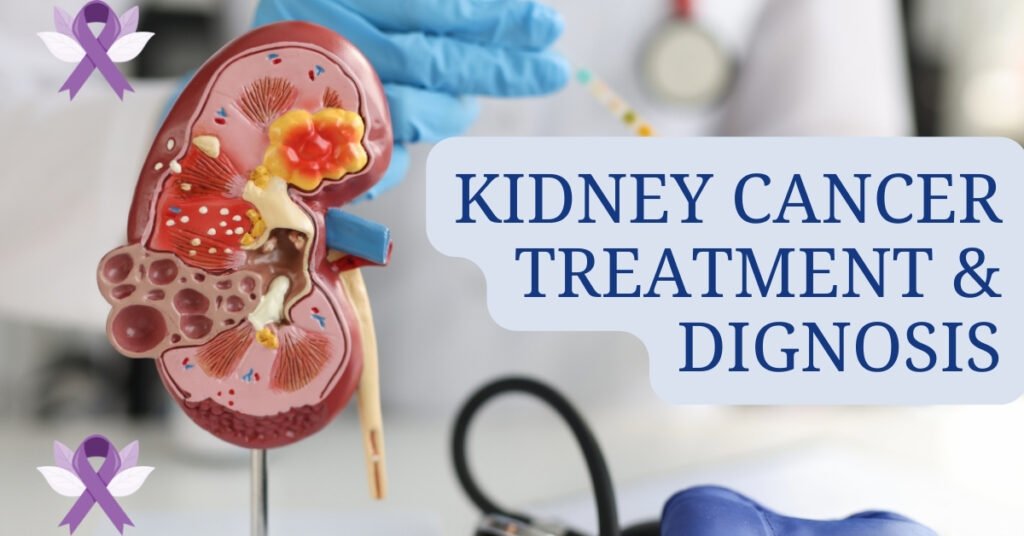Kidney Cancer Treatment and Diagnosis

Cancer, characterized by the uncontrollable growth of abnormal cells, can occur in various parts of the body. When it originates in the kidney, it’s termed as kidney cancer, which can pose a serious threat if not detected early. Recognizable symptoms, including blood in the urine, persistent back or side pain, fatigue, unexplained weight loss, fever, and abdominal lump, can escalate over time. Regular screenings are crucial to mitigate uncertainty surrounding kidney cancer diagnosis and progression. Let’s delve deeper into understanding the diagnosis and treatment options for kidney cancer.
Kidney Cancer Diagnosis:
Determining the presence and severity of kidney cancer relies on multiple factors, such as the symptoms experienced by the patient, results of diagnostic tests like blood and urine tests, imaging scans such as CT scans, MRI, and ultrasound, and sometimes, a biopsy to confirm the diagnosis. Despite these considerations, healthcare professionals employ a range of diagnostic tools and techniques to accurately identify kidney cancer in its early stages, which is crucial for effective treatment.
- Blood and urine tests:
- Blood tests: Evaluation of kidney function through measurements of creatinine and blood urea nitrogen (BUN).
- Urine tests: Detection of abnormalities such as hematuria (blood in the urine), a common symptom of kidney cancer.
- Imaging tests:
- CT scans: Cross-sectional imaging technique used to create detailed images of the kidneys and surrounding structures.
- MRI (Magnetic Resonance Imaging): Imaging technique that uses magnetic fields and radio waves to produce high-resolution images of the kidneys, helping identify masses or lesions.
- Ultrasound: Real-time imaging technique using sound waves to generate images of the kidneys, providing information about size, shape, and any suspicious areas.
- Biopsy: Procedure involving the insertion of a small needle into the kidney to collect tissue samples. Then examining the tissue samples under a microscope to confirm the presence of kidney cancer and determine its specific characteristics.
Recent posts
The Silent Threat: Understanding the Heartbreaking HMPV Outbreak Human metapneumovirus (HMPV) is currently causing a significant surge in respiratory infections worldwide. This …
Tips for Managing Type 2 Diabetes Effectively Managing Type 2 diabetes effectively is crucial to maintaining overall health and preventing serious complications …
What are the stages of kidney cancer?
The prognosis depends on one’s general health, as well as the grade and stage of the kidney cancer. Below mentioned are the stages of kidney cancer. The higher the stage, the more advanced the cancer.
- Stage I: At this stage, the tumor is relatively small, measuring 7 centimeters or less, and it remains localized within the kidney.
- Stage II: The tumor has grown larger than 7 centimeters, but it still hasn’t ventured beyond the confines of the kidney.
- Stage III: This is where things start to get serious. The tumor has infiltrated nearby lymph nodes or blood vessels, or it may have penetrated the fatty tissue surrounding the kidney. However, it hasn’t breached the adrenal gland or surpassed Gerota’s fascia.
- Stage IV: Unfortunately, the cancer has now spread beyond the kidney’s boundaries. It could have invaded neighboring lymph nodes or metastasized to other organs like the bowel, pancreas, or lungs. Additionally, it has broken through Gerota’s fascia, possibly even involving the adrenal gland. Tough times indeed.
Can kidney cancer be treated?
The chance of curing kidney cancer depends on various factors, including the stage at which it’s detected, the age and overall health of the patient, any existing medical conditions they may have, their genetic makeup, and even lifestyle factors like smoking habits and diet. Despite these complexities, there are treatment methods that have shown effectiveness in treating kidney cancer. These treatments include:
Surgery:
Surgery stands as the cornerstone of kidney cancer treatment, serving as the primary method to remove cancerous tissue. It typically involves either partial or radical nephrectomy, depending on the extent of the disease.
- Partial nephrectomy: During partial nephrectomy, only the tumor and a portion of surrounding healthy tissue are removed, preserving as much kidney function as possible.
- Radical nephrectomy: This method involves the complete removal of the affected kidney, sometimes along with nearby lymph nodes and adrenal glands if required.
Surgeons may opt for minimally invasive techniques, such as laparoscopy, to reduce recovery time and minimize scarring.
Ablation Therapies:
Ablation therapies offer alternative treatment options for kidney cancer, particularly for individuals who are not suitable candidates for surgery or those with small tumors. These therapies utilize either radiofrequency ablation (RFA) or cryoablation to destroy cancerous tissue.
- Radiofrequency Ablation(RFA): In RFA, high-frequency electrical currents generate heat, which effectively kills cancer cells.
- Cryoablation: This method involves freezing the tumor, causing ice crystals to form within the cells and leading to their destruction.
Both methods are typically performed under imaging guidance to ensure precise targeting of the tumor while minimizing damage to surrounding healthy tissue.
Targeted Therapy:
Targeted therapy represents a significant advancement in kidney cancer treatment, offering medications designed to specifically target molecules or pathways involved in cancer cell growth and survival. By interfering with these specific targets, targeted therapy drugs can impede the progression of the disease and reduce tumor size. Unlike traditional chemotherapy, which affects both cancerous and healthy cells, targeted therapy tends to have fewer side effects and is often better tolerated by patients. Common targeted therapy drugs for kidney cancer include tyrosine kinase inhibitors (TKIs) and mTOR inhibitors, which have demonstrated efficacy in slowing disease progression and improving patient outcomes.
Immunotherapy:
Immunotherapy harnesses the power of the body’s immune system to combat kidney cancer. These treatments work by stimulating the immune system to recognize and attack cancer cells more effectively. One type of immunotherapy commonly used for kidney cancer is checkpoint inhibitors, which block inhibitory pathways that cancer cells exploit to evade detection by the immune system. By removing these brakes on the immune response, checkpoint inhibitors can unleash the body’s natural defenses against cancer. Immunotherapy has shown promising results in extending survival and improving the quality of life for some kidney cancer patients, particularly those with advanced or metastatic disease.
Radiation Therapy:
While less commonly used than surgery or systemic therapies, radiation therapy plays a role in the management of kidney cancer, particularly in cases where surgery is not feasible or as a palliative treatment to alleviate symptoms. Radiation therapy uses high-energy X-rays or other forms of radiation to target and kill the cancerous cells. It may be employed to shrink tumors before surgery, alleviate pain or discomfort caused by metastatic lesions, or as a primary treatment for localized kidney cancer in select cases. The precise delivery of radiation helps minimize damage to surrounding healthy tissues, reducing the risk of adverse effects.
In conclusion, the outlook for kidney cancer patients varies depending on cancer type, stage, overall health, and treatment response. Early detection of cancerous tumors is very important, emphasizing the importance of regular screenings. While doctors cannot predict the exact course of the disease, factors like tumor growth rate and patient health influence prognosis. Generally, early diagnosis leads to better outcomes. Maintaining a healthy lifestyle and adhering to treatment plans are essential for improving prognosis and overall well-being. Regular communication with healthcare providers ensures ongoing monitoring and adjustments to treatment strategies.

Dr. A. Venugopal
Clinical Director & HOD, Senior Consultant Medical Oncologist and Hemato Oncologist
About Author
Dr. A. Venugopal
MD (General Medicine), DM (Medical Oncology), MRCP – SCE Medical Oncology (UK), ECMO (Switzerland).
Dr A. Venugopal is One of the best medical oncologist and Hemato Oncologist in hyderabad, currently serving as the Head of the Department and Senior Medical Oncologist, Hemato Oncologist at Pi Health Cancer Hospital in Gachibowli, Hyderabad. He brings over 15 years of extensive experience in the field of Oncology.


